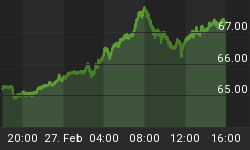Based on the November 2013 Market Overview report.
"I believe that the Federal Reserve's asset purchases and other unconventional policy actions have helped, and are continuing to help, fill this gap and thus shore up aggregate demand."
As we mentioned previously (in case of Bernanke) it is always worthwhile to study previous careers of potential central bankers in order to understand their future role in case they get elected (Alan Greenspan being a proud exception to that rule!). It is therefore advisable to see past interpretations and opinion of Janet Yellen. They could signal the directions of future Fed's decisions.
At the conference "A Trans-Atlantic Agenda for Shared Prosperity" Yellen expressed her concern about the labor markets (the transcript was published on Federal Reserve's webpage). She emphasized the aggregate variables once again. She also spoke about the special conditions, in which the interest rate was reduced effectively to zero percent. Since further cutting is impossible, the Fed had to (she implies) go further and do something which may appear as additional interest rate cutting (assuming that was possible). The solutions were extensively discussed by Bernanke. As the above quote shows Yellen believes that it is a right way to go - forget the bubble, keep the printing machine ready in order to boost aggregate demand and increase output and employment.
Official employment levels have improved no doubt. But Yellen warns us not to be excited about this change, because some people are working part time (and they would prefer to work full time). Also there are thousands of people who gave up looking for a job during this recession. The methodology excludes those people from official unemployment statistics. The future Fed's chairman, therefore, argues that concerns about unemployment should be higher than what official statistics show. What does this mean for possible monetary policy? Do not necessarily tighten the policy if the official rate goes down further, because labor market still have to be stimulated for some reason. More "dovish" than "hawkish".
When analyzing the unemployment rate in the typical mainstream economics discussion one always tries to answer the question: is unemployment "structural" or "cyclical"? If it's "structural", it means that it has a lot to do with "real" economy, and that it cannot be easily healed by the government.
Apparently the employees demanding work do not correspond with their skills to employers supplying jobs. If the unemployment is "cyclical", it means that it is caused by the strange phenomenon of "business cycle", therefore can be macroeconomically solved. As you probably imagine the "solution" is the government. Or more technically the "solution" lies in the low levels of overall "aggregate demand", which can be boosted by government spending and the central bank's active policy. Yellen stated that she interprets the current evidence as indicating that most of the unemployment is "cyclical", hence it can be lowered by the intervention.
More "doves" thank "hawks" flying around. Again, another indication that she is willing to promote more inflationary policies at the Fed: employment levels are to be become even more important target for the Fed.
Under those circumstances gold appears to feel comfortable in the longer run.
Thank you.
The above is a small excerpt from our November gold Market Overview report. If you enjoyed it, please consider subscribing.















